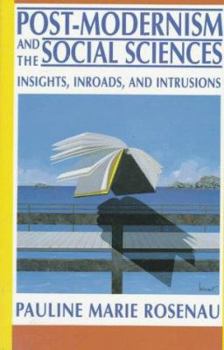Post-Modernism and the Social Sciences: Insights, Inroads, and Intrusions
Select Format
Select Condition 
Book Overview
Post-modernism offers a revolutionary approach to the study of society: in questioning the validity of modern science and the notion of objective knowledge, this movement discards history, rejects humanism, and resists any truth claims. In this comprehensive assessment of post-modernism, Pauline Rosenau traces its origins in the humanities and describes how its key concepts are today being applied to, and are restructuring, the social sciences...
Format:Paperback
Language:English
ISBN:0691023476
ISBN13:9780691023472
Release Date:November 1991
Publisher:Princeton University Press
Length:248 Pages
Weight:0.85 lbs.
Dimensions:0.7" x 6.1" x 9.2"
Customer Reviews
4 ratings
Excellent, clear, concise, engaging summary of the issues
Published by Thriftbooks.com User , 20 years ago
Outstanding book! One of the best overviews of the often confusing post-modern literature I have ever encountered. Highly recommended!!!
Timely and well done
Published by Thriftbooks.com User , 24 years ago
It's really hard to know how a nihilistic movement such as post-modernism can have anything other than a renunciatory effect upon science of any kind. That notwithstanding, Rosenau distinguishes two main strands within PoMo, which may otherwise cause confusion. The skeptical strand comprises the purists who brook no compromise with their anti-foundational findings. On the other hand, are what Rosenau calls the"affirmatives". They comprise the compromisers within the broader PoMo camp, and are prepared to somehow accomodate modernist precepts within a broader PoMo framework. Whether these affirmatives compose anything more than an unworkable eclecticism, is left wisely unresolved. Even so, Rosenau believes their sensitivity to openess has the capacity to force modernism into major revisions. In any event, it is the purists, the other major strand, who define the movement itself.If the affirmative's problem is trying to eclectically blend unblendables, the skeptics tend to refute themselves, the usual outcome of extreme abeyance. In an excellent concluding section, the author summarizes the endemic paradoxes of this position. For example, PoMo's use of theory to disavow theory; deconstruction's use of the very tools it deconstructs, viz. reason and logic; moreover, in raising the marginal at the expense of the center, a value judgement takes place even when such judgements are programmatically condemned. Boiled down to basics, purist PoMo ends in its own version of solipsism: millions of unsynthesizable personal narratives. Small wonder that only the narrowest, most localized results are sanctioned in a prospective post-modern social science. In Rosenau's account, the possibility that such a science can emerge focuses on individuals instead of subjects or personalities. Since reason, structure, and other modes of synthesis are impossible, how such idiosyncratic accounts can even approach a threshold of science seems inexplicable to me even after reading the book. But since PoMo is the fashion of the day, it's to the author's credit to have crystallized these topical questions in clearly understood terms.
A Modern Classic in the Social Sciences
Published by Thriftbooks.com User , 24 years ago
As a graduate student I encountered this book on several levels over the years. I first bought it in India while doing anthropological fieldwork to catch up on theory. The applications on social inquiry to the "Third world" were very helpful, especially the section on views of the west in the post-Marxist era. More recenty I have read it with an interest in public policy, and found relevant insights on the nature of the public sphere. The glossary is unique in its throroughness. This book serves as a classic--elegantly written, comprehensively researched- and more importantly a useful guide to postmodern ideas for the working academic and student alike.
A Modern Classic in the Social Sciences
Published by Thriftbooks.com User , 24 years ago
Through my years in graduate school I have encountered this book on several levels- I first used it in India while working as an antrhopologist to review the basics and get "caught up" with some theroy. The book proved to be especially useful in applying postmodern ideologies to the "Thrid World". More recently I have re-read it with a focus on public policy, and again was not disappointed. Dr. Rosenau's research is impeccable and comprehensive. The book is useful for both experienced academicians as well as beginners.





